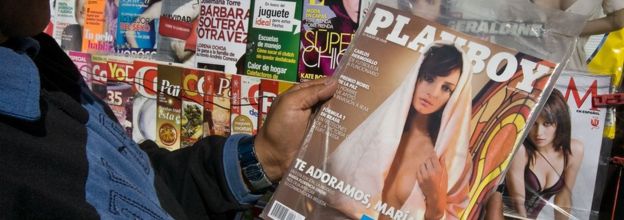Playboy magazine is to stop publishing images of naked women as part of its redesign, it has emerged.
Its US owners say the internet has made nudity outdated, and pornographic magazines are no longer so commercially viable.
Playboy's circulation has dropped from 5.6 million in the 1970s to the current 800,000, official figures show.
However, the magazine will still feature women in provocative poses - though not fully nude.
Battle won
The decision was apparently taken last month at a meeting attended by Playboy founder and current editor-in-chief Hugh Hefner.
Magazine executives admitted that Playboy - which was founded in 1953 - had been overtaken by the changes it pioneered, according to the New York Times.
"That battle has been fought and won," Playboy chief executive Scott Flanders is quoted as saying by the newspaper.
"You're now one click away from every sex act imaginable for free. And so it's just passe at this juncture."
Gone, too, are the days when interviews with figures of the stature of Martin Luther King Jr, Malcolm X and Jimmy Carter made Playboy so culturally and politically significant, says the BBC's Nick Bryant in New York.
Playboy's website has already banished nudity, partly to give it access to social media platforms like Facebook and Twitter. And its popularity has soared, with web traffic quadrupling.
A brand long synonymous with salaciousness is cleaning up its act, and all with the blessing - apparently - of the 89-year-old Mr Hefner, our correspondent adds.

60 years of Playboy
- Playboy's logo showing a rabbit head wearing a bow tie is one of the most recognisable in the world. The company makes most of its money from licensing it around the world to sell products including toiletries, drinks and jewellery, including a necklace worn by the character Carrie Bradshaw in the TV series Sex and the City. About 40% of merchandising income is generated in China, where the magazine itself is not available.
- Among the magazine's most famous interviews was a 1976 conversation with Jimmy Carter in which the then presidential candidate admitted he had desired women other than his wife, confessing he had "looked on a lot of women with lust" and "committed adultery in my heart many times". Other notable interviewees included jazz musician Miles Davis in 1962; writer Vladimir Nabokov in 1964; and John Lennon and Yoko Ono in 1981.
- The Library of Congress in Washington produces a Braille version of Playboy, one of 30 general-interest magazines that are translated for the blind and visually-impaired. In 1985, Congress voted to stop producing a Braille Playboy over morality concerns and to save money. But a group of blind Playboy readers sued for their right to read the magazine and a judge ruled that the ban violated their First Amendment rights under the US constitution. The Braille version can be viewed here.
- Playboy has gained a reputation for riffing off business stories, beginning with a "Women of Wall Street" series in 1989 featuring nine stock market workers - shortly afterwards, seven of the nine were revealed to have left their jobs. Playboy continued with "Women of Enron" and "Women of WorldCom" shoots after those companies collapsed. It revisited the "Women of Wall Street" theme as the global financial crisis hit in 2008. The magazine advertised for models, requiring them to have worked for a financial institution and expressing a preference for those with senior management experience.
- Not everybody has been pleased to appear in Playboy. In 2006, actress Jessica Alba refused to pose for a photo shoot so the magazine instead took an image from a film poster and put it on the front cover. Alba sued, arguing that appearing on the front cover suggested there would be nude photographs of her inside and this had caused "immeasurable harm" to her reputation. Hugh Hefner sent a personal apology and donated money to her favourite charities

